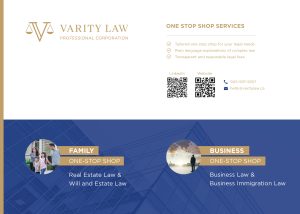2022 was off to a gloomy start for many of our business clients, as Ontario government announced many restrictions such as the closing of indoor facilities. Whether we like it or not, remote working will be a part of our everyday lives now. Thankfully, many of our corporate clients have already adapted and are leveraging the situation as they reach more remote clients, reduce office expenses, and decrease commute time.
Moving to remote working comes with a host of new legal concerns that should be addressed. Today, we will go over 3 common blindspots for our entrepreneur clients, so they may avoid losses and focus on gains.

-
Who is your client?
Before, in-person meetings with clients may be necessary or at least preferred. Now, communicating via emails, phone calls, and video conferencing are the norm. Often, it is harder to identify who is your client using those methods. In some bad scenarios, someone may impose as your client, or that person may be a lower-ranked employee in a company with no authorization to make decisions for the company. If you happen to seal a deal with those people, many bad consequences may follow – in the least the deal would not be binding.
To prevent this, you should request formal personal and corporate identifications. Preferred personal IDs include driver’s license, passport, citizenship or PR card, and firearm license – IDs where the relevant government department have done their due diligence in verifying the individual in question. You also don’t want to get 2 IDs that are usually renewed at the same time – such as driver’s license and health card – because if the name is spelled wrong on one, it’s spelled wrong on both.
For corporate clients, it’s best to look at their certificate or article of incorporation, corporate profile, and corporate minute book. Those documents will show you who are the directors and shareholders, and whether the corporation is currently in good standing (e.g. did not dissolve or go bankrupt, not in litigation). Of course, more extensive searches, such as bankruptcy and litigation search, can be performed by business lawyers. Varity Law can definitely help with personal & corporate identification and due diligence searches.

-
Use Formal Legal Documents
Often, it’s easier to avoid miscommunications when meetings are done in person, as we can read a person’s tune and gestures. In contrast, virtual meetings may result in many misunderstandings, especially when it comes to the details of the deal.
A good way to avoid this is to have formal legal contracts in place to solidify important business decisions. Common agreements include:
- Shareholder Agreement – share classes, dividend distributions, decision making rules, shareholder exit clauses
- Client Agreement – services or goods to be provided, fees charged, dispute resolution
- Employee and Independent Contractor Agreements – their working hours, wages, and duties
- Loan Agreement – Principal, Interest, Monthly Payments, Default (what happens when the agreement is violated), Collateral
- Other documents showing important business decisions – e.g. corporation decided to change share structure, merger or acquisition, franchising, closing down (usually would require the signatures of all directors and shareholders)

-
Subleasing Your Office
As the pandemic drags on, many corporations are looking to reduce their office expenses as they no longer use it much. While many commercial landlords are not okay with their tenants backing out of the lease, they may be more open to subleasing.
While this seems like a great idea to reduce expenses, be aware of the following:
- The original lessee (the person who signed the contract with the landlord) must be responsible for the subleasee – that means, even if the subleasee does not pay rent, the original lessee nevertheless must pay full rent to the landlord – of course, the lessee can use various legal means to enforce the contract they signed with the sublessee — but it has nothing to do with the landlord and they still collect their normal rent
- Set rules for any assets or equipment in the office may be shared or at least accessible to the sublessee – it’s important to clearly state who can use, or take, what
- Some big decisions, such as interior renovations, require the consent of landlord –the original lessee has no authorization on those things – so if the sublessee did renovations without the landlord’s consent, the original lessee will likely be held responsible for any damages caused during the renovations – in worse cases, the original lessee must reverse the office back to how it was before the renovations

Conclusion
COVID-19 continues with no end in sight as more variants show up. Nevertheless, as a fellow entrepreneur we can choose to make the best out of the situation, such as reaching more remote clients, reducing office expenses, and leveraging the decreased commute time.
To recap, the 3 ways of avoiding losses when working remotely are: (1) ask for proper client identifications; (2) use formal legal contracts; (3) understand & prevent the risks associated with subleasing your office. As 2022 goes on, Varity Law is honoured to continue serving our corporate clients by helping them to prevent losses and secure gains. Here’s to wishing everyone a prosperous year!







